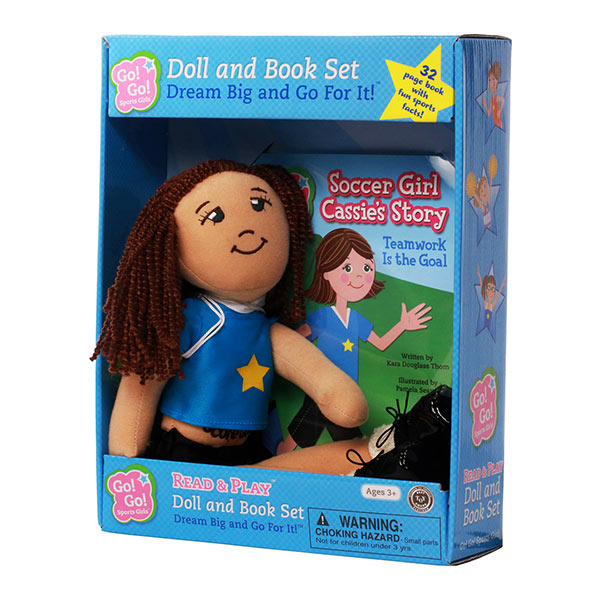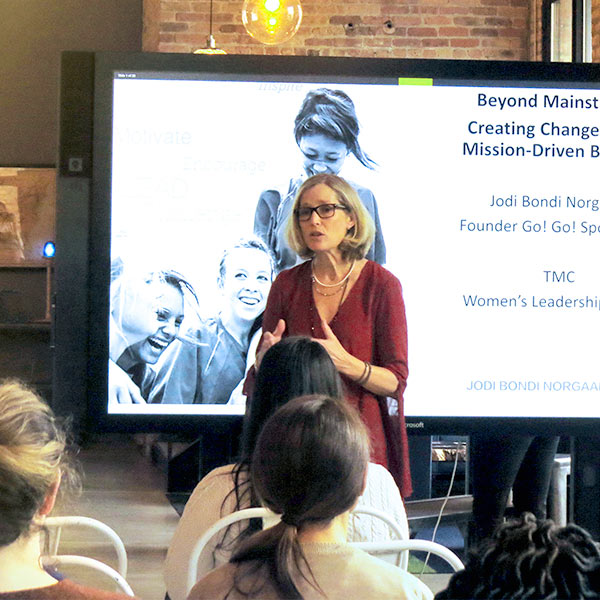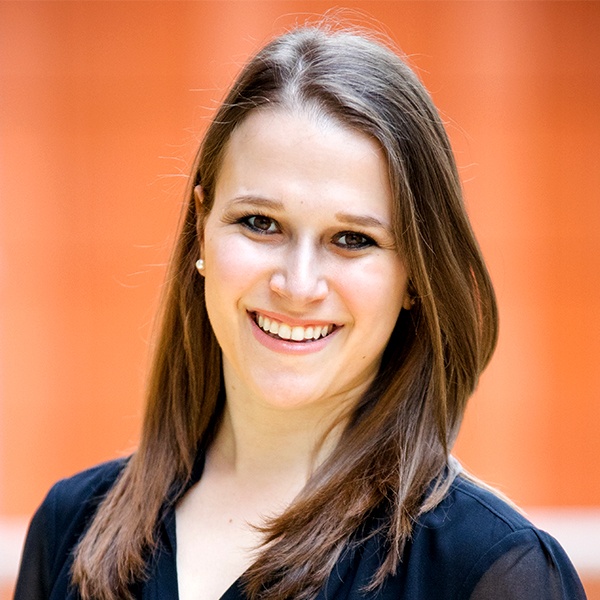Written by Travis Linderman, managing director of Innovation DuPage, and Ginger Wheeler, a copywriter/marketer in Chicago. The article first appeared in Glen Ellyn Living’s February 2019 edition as “Mom on a Mission: Helping Girls Achieve Their Full Potential.”
A perfect world to Jodi Norgaard, a long-time Glen Ellyn resident and mom of three, would be one where the world viewed equally the contributions of men and women for equal gender balance. As a mom of two boys and one girl, Norgaard became concerned about how the world would treat her daughter as compared to her sons. This epiphany happened while shopping for an age-appropriate toy for a girl’s birthday gift in Glen Ellyn. One thing led to another in a string of events – with some successes and many challenges – and now Norgaard is a public speaker on a mission to make change and help others as a mentor with Innovation DuPage.
For the past two years, Norgaard has been speaking to women’s groups, corporations, universities and even the Obama White House. She talks about how her experiences in the toy aisle and her research on how toys shape long-term perceptions and values for our culture changed her as well as what she learned from the challenges of creating and launching a line of dolls: “Go! Go! Sports Girls.”
A Mission Taking Shape
It all began one day when Norgaard and her 9-year-old daughter, fresh from soccer practice, were shopping for a birthday gift at a Glen Ellyn toy store. The only dolls offered were dressed in provocative, skimpy shorts and halter tops with long flowing hair, dangling earrings and high heels. Even the so-called “STEM” toys, such as building blocks and chemistry sets, sent a message: build a car or watch an exploding volcano for boys, build a house or make nail polish for girls.
These micro-aggressions are like little tiny paper cuts,” Norgaard said. “Saying things like, ‘you throw like a girl’ hurled as an insult just go to show how ingrained the image of ‘girls as less’ is in our society.
Outraged that the toy market for girls was focused so inappropriately on a girl’s appearance, instead of her interest in action and adventure, Norgaard decided to do something about it. She got the idea to create a female-positive role model doll that reflects the reality of who little girls really are: active, energetic and interested in more than makeup and fashion.
Much hard work and many months later, armed with tons of research to prove the product would be welcomed profitably in the toy aisle, Norgaard launched Go! Go! Sports Girls. The soft, plush dolls had a body that reflected the actual measurements of her own (by then) 10-year-old daughter. (As opposed to the unrealistic measurements of, say, a certain best-selling toy with a name that rhymes with “Darbie.”)
Each doll in Norgaard’s line was provided a name and a backstory that included a love of a sport, such as gymnastics, swimming, soccer, tennis, or cheerleading, along with some accessories tied to that sport. Norgaard introduced Go! Go! Sports Girls to the toy market through national toy shows attended by toy store buyers, ready and excited to see change start to happen.

Launching a Winning New Product in a Hesitant Market
Go! Go! Sports Girls won awards. It was applauded as innovative, a breakthrough, the next big thing. It was featured in national magazines and talk shows on television. During a test run at the U.S. Open, 500 pieces sold out. All the research pointed toward a product winner. Market research showed people would buy it. Experts claimed the toy would offer long-term benefits for girls’ self-esteem and boys’ attitudes toward girls.
Yet, against all logic, Norgaard heard, “Nice, but no, thanks. It’s not mainstream, it won’t sell.” Even after Walmart agreed to carry the toys along with a book accompanying each doll (making publishing yet another industry, in addition to manufacturing and the toy industry itself, Norgaard had to learn from scratch), traditional toy store buyers still were reluctant to give her product a chance.
Why? Because it wasn’t about fashion or a girl’s appearance – which, incidentally, was the whole point.
The Pivot
Ultimately, treatment of her product by retail buyers convinced Norgaard that attitudes needed to change. She said, “Mainstream ideas don’t create change, so I dug in my heels.” She sold her promising company to a toy manufacturer with more marketing muscle and resources and pivoted to become a public speaker on a mission to create change.
Two years after relaunching herself as a public speaker, she is as busy as she wants to be, speaking approximately weekly during the “convention” season of spring and fall across the country. She is represented by two speakers’ bureaus and is paid for her speaking engagements. Her travel costs are covered as well.
Norgaard said, “The goal is to truly inspire people by telling my story: the hardships, the challenges; how I figured out how to manufacture a toy for the US toy market and the roadblocks in the way; how my idea that girls deserved more; and that I had a pulse of what parents really wanted for their girls, an idea way ahead of its time.”
“Today, with #MeToo and #TimesUp and the concept of unconscious bias coming to light, things are different. But there are still what I call micro-aggressions that say boys are strong and girls are weak. We need to be aware of these, and I highlight that in my talks,” she added.

Norgaard was twice invited by the Obama White House to speak at conferences on the issue of gender parity in children’s toys, toy promotions and their media. She said her message is to make people aware that, to reach the pinnacle of success as a culture (or a business), changes in the way girls are treated in our society are imperative. One stunning fact: 94 percent of women occupying the C-Suite said they played team sports as a child. Yet before Norgaard launched Go! Go! Sports Girls, there were zero toys that linked girls with sports.
But before change scan be made, problems must be identified.
“These micro-aggressions are like little tiny paper cuts,” Norgaard said. “Saying things like, ‘you throw like a girl’ hurled as an insult just go to show how ingrained the image of ‘girls as less’ is in our society.”
Making Change Happen
Norgaard said her message is resonating with all audiences. “Everyone that I talk to – especially men who are raising daughters – are shocked when they hear me. They agree that treating women and girls as equals is right. If you are going to create change though, it has to start at a young age. We have to create change with boys and girls.”
In addition to her ongoing speaking schedule, Norgaard will be mentoring other up-and-coming entrepreneurs at Innovation DuPage. She will be sharing her experiences and advising participants in the program to help them achieve success faster than they might have on their own.
“Collaboration and working with others is key,” Norgaard said. “I asked and asked and asked anyone and everyone questions along the way. I’m thrilled at the opportunity to work with Innovation DuPage and can’t wait to see the results for our County.”





